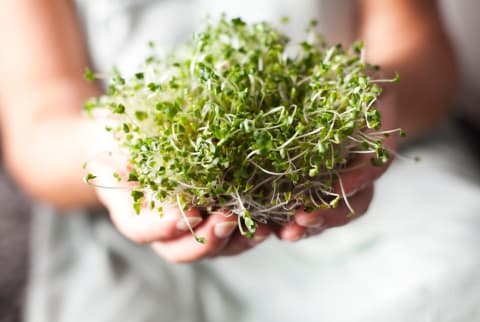Advertisement
Why Broccoli Sprouts Support Brain Health + How To Eat More Of Them


You likely know that broccoli is an anti-inflammatory health food—but have you heard of broccoli sprouts? These germinated seeds of the broccoli plant are a superfood with incredible benefits for brain health. Here's what makes them so nutritious, and how to work them into your diet:
What makes broccoli sprouts so healthy?
They contain antioxidant-rich sulforaphane
Perhaps the most powerful and studied component of broccoli is sulforaphane1—a sulfur-rich compound that reduces oxidative stress that can contribute to brain disease2. A full-grown head of broccoli does contain sulforaphane, but broccoli sprouts have 10 to 100 times more3!
On day three or four of growing broccoli, when the sprouts are one to two inches tall, is when the plant's sulforaphane content is highest. According to a report published in the Proceedings of the National Academy of Sciences4, just a small 1-ounce serving of broccoli sprouts provides 73 milligrams of sulforaphane glucosinolate.
Scientists don't believe5 there is a certain amount of sprouts we need to consume to gain neuroprotective benefits, so we should simply plan to eat them frequently. I personally eat broccoli sprouts every few days to ensure I am getting some sulforaphane into my cells.
They help prevent DNA damage
During oxidative stress, large amounts of reactive oxygen species such as hydrogen peroxide (H2O2), hydroxyl radical, and superoxide anion are produced that damage DNA6. DNA damage leads to mutations that, in turn, are associated with diseases such as cancer and coronary heart disease, as well as inflammatory diseases such as arteriosclerosis and anxiety.
Eating broccoli and broccoli sprouts is one way to prevent DNA damage.7
They contain anxiety-easing chlorophyll
I wish every human being on the planet consumed chlorophyll—the green pigment in plants—on a daily basis. Chlorophyll is a compound found in dark leafy greens like kale, spinach, collard greens, dandelion greens, turnip greens, broccoli and broccoli sprouts, and blue-green algae, like chlorella and spirulina.
Although I feel that chlorophyll has been understudied, it has been shown to have many benefits for brain health specifically. For example, chlorophyll contains magnesium, which we know helps to reduce anxiety8.
Chlorophyll can also help reduce inflammation in the body. It has been shown to enhance oxidative stress tolerance9, meaning it helps your body adapt to stressful conditions easier.
My favorite ways to use broccoli sprouts
You can purchase broccoli sprouts at many health food stores and certain grocery stores. Broccoli sprouts have a shorter shelf life and cost more than other types of sprouts, so not every supermarket carries them. It's also easy to grow your own, though, and start a sprout garden at home. Once you get your hands on broccoli sprouts, here are my favorite ways to use them:
- Add broccoli sprouts to your juice or smoothie to get a nice serving of sulforaphane.
- Start to think of broccoli sprouts as a kitchen staple. Stock up on some every week, and then think, "How can I add broccoli sprouts to this?" whenever you’re cooking. Add them to everything from soups and salads to main dishes. Sprinkle them on meats or place a wild salmon fillet on a plate full of sprouts.
- Roll up broccoli sprouts into balls and add them to ice cube trays with water. Then pop a few of these into your smoothies and shakes! Freeze a bunch of them so you always have them on hand ready to add. This idea came from my friend Doug Evans, who wrote The Sprout Book.
- Add broccoli sprouts into your scrambled eggs or omelet.
- Whip up the following refreshing sprout salad
Green Sprout Salad
This ultimate green salad is made from dark leafy greens, among the most powerful foods for reducing stress and anxiety. Built on a foundation of herbs, this salad is so simple yet really flavorful and refreshing.
Total prep time: 15 minutes
Makes 1 serving
Ingredients:
- 1 avocado, cubed
- 1 cup fresh parsley leaves
- 1 small cucumber, sliced
- 1 cup fresh cilantro leaves
- 1 cup broccoli sprouts
- 1/4 cup grated broccoli
- 1 lemon
- 1 tablespoon extra-virgin olive oil
- Sea salt and pepper, to taste
Method:
- Add all the ingredients except the lemon and olive oil to a bowl and toss until well combined.
- Slice the lemon in half and squeeze lemon juice over the salad, then drizzle with olive oil. Season with salt and pepper, to taste.
The takeaway
Broccoli sprouts are a brain-boosting food that can help ease anxiety and support whole-body health. I love to eat them in salads and smoothies every few days for a quick hit of functional nutrition.
Adapted from an excerpt of Anxiety-Free With Food: Natural, Science-Backed Strategies to Relieve Stress and Support Your Mental Health by Liana Werner-Gray with permission from the author.
9 Sources
- https://pubmed.ncbi.nlm.nih.gov/33207780/
- https://www.ncbi.nlm.nih.gov/pmc/articles/PMC8698986/
- https://www.ncbi.nlm.nih.gov/pmc/articles/PMC8394606/
- https://pubmed.ncbi.nlm.nih.gov/9294217/
- https://www.ncbi.nlm.nih.gov/pmc/articles/PMC6804255/
- https://pubmed.ncbi.nlm.nih.gov/16978905/
- https://pubmed.ncbi.nlm.nih.gov/25054107/
- https://pubmed.ncbi.nlm.nih.gov/28445426/
- https://www.ncbi.nlm.nih.gov/pmc/articles/PMC4830245/